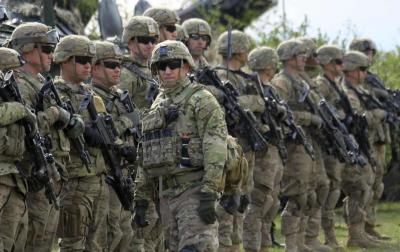
Hey folks, finally some good news: maybe World War III will end human civilization before the elections and we won't have to have to face either a Trump or a Clinton II presidency.
War With Russia Without Public Debate? (The Nation)
Cohen thinks this worst-case scenario cannot be ruled out, for several reasons. The NATO build up is not episodic but intended to grow and be permanent, and be ratified at the NATO summit in Warsaw in July. No such hostile forces have amassed on Russia’s Western frontiers—now from the Baltic to the Black Sea—since the Nazi German invasion in 1941....The only explanation given by the US-led NATO is “Putin’s aggression” in Ukraine, but that was more than two years ago. (Claims that he is now menacing the small Baltic states and Poland are clearly without any basis in fact.) Not surprisingly, Cohen reports, Moscow is reinforcing its own conventional and strategic (probably nuclear) forces on its Western territories, bringing the two powers to a Cuban missile crisis–like confrontation. Even leaving aside accidental military acts, there are many other potential tripwires, from Ukraine and Turkey to Syria.
Astonishingly, this looming possibility of war with Russia has gone largely unreported and entirely undebated in mainstream American media. Neither Batchelor nor Cohen can think of a precedent for such a media blackout or indifference. The situation, according to Cohen, is quite different in Russia, where NATO’s buildup is hotly debated on, for example, prime-time television talk shows.
And Cold War rhetoric and strategizing is definitely back:
The United States and NATO Are Preparing for a Major War With Russia (The Nation)
For the first time in a quarter-century, the prospect of war—real war, war between the major powers—will be on the agenda of Western leaders when they meet at the NATO Summit in Warsaw, Poland, on July 8 and 9. Dominating the agenda in Warsaw (aside, of course, from the “Brexit” vote in the UK) will be discussion of plans to reinforce NATO’s “eastern flank”—the arc of former Soviet partners stretching from the Baltic states to the Black Sea that are now allied with the West but fear military assault by Moscow. Until recently, the prospect of such an attack was given little credence in strategic circles, but now many in NATO believe a major war is possible and that robust defensive measures are required.
In what is likely to be its most significant move, the Warsaw summit is expected to give formal approval to a plan to deploy four multinational battalions along the eastern flank—one each in Poland, Lithuania, Latvia, and Estonia. Although not deemed sufficient to stop a determined Russian assault, the four battalions would act as a “tripwire,” thrusting soldiers from numerous NATO countries into the line of fire and so ensuring a full-scale, alliance-wide response.
Roy (not verified)
Sat, 07/16/2016 - 20:38
Permalink
Tom Swiss is an idiot
Tom concludes, "... thrusting soldiers from numerous NATO countries into the line of fire and so ensuring a full-scale, alliance-wide response."
And if there were no military presence, Russia would just walk across those countries like they did into Crimea. When they advanced into Ukraine, resistance from Ukraine prevented a full takeover of the country. And Putin lied and lied to his people about it. The NATO forces in the Baltic countries are akin to the Ukrainian forces.
Tom Swiss
Fri, 07/29/2016 - 10:54
Permalink
In reply to Tom Swiss is an idiot by Roy (not verified)
Russians were invited into Crimea
That's not my conclusion, it's quoted material.
The Russians were invited into Crimea by Ukraine's lawful President in the face of a Western-supported coup -- a decision he later regretted, to be sure, but Russia did not invade, they were invited. http://www.npr.org/sections/thetwo-way/2014/04/02/298385578/yanukovych-…
They were never trying to take over the whole country. It was a opportunity to re-take territory that's been disputed for centuries. http://www.bbc.com/news/world-europe-18287223
The people of Crimea -- who are 58% ethnic Russia -- then voted to rejoin Russia. http://www.npr.org/sections/thetwo-way/2014/04/02/298385578/yanukovych-…
The vote was questionable and disputed but so was the one that installed the post-coup government in Kiev. Hell, so was the recent Democratic primary. And a poll a year later, conducted by a German company, found a strong majority of people thought they were better off in Russia. http://www.forbes.com/sites/kenrapoza/2015/03/20/one-year-after-russia-…
The portrayal of Russia as unprovoked aggressor is the story pushed by neocons in both our major parties, but it's far from accurate.